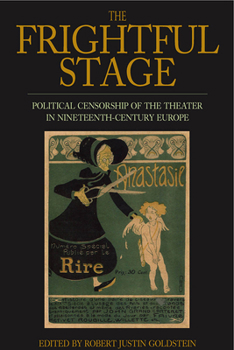The Frightful Stage: Political Censorship of the Theater in Nineteenth-Century Europe
Select Format
Select Condition 
Book Overview
In nineteenth-century Europe the ruling elites viewed the theater as a form of communication which had enormous importance. The theater provided the most significant form of mass entertainment and was the only arena aside from the church in which regular mass gatherings were possible. Therefore, drama censorship occupied a great deal of the ruling class's time and energy, with a particularly focus on proposed scripts that potentially threatened...
Format:Paperback
Language:English
ISBN:0857451715
ISBN13:9780857451712
Release Date:September 2011
Publisher:Berghahn Books
Length:322 Pages
Weight:0.95 lbs.
Dimensions:0.7" x 6.0" x 9.0"
Customer Reviews
0 rating





